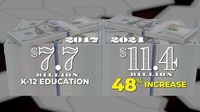In a landscape dominated by traditional college entrance exams, a new contender is making waves: the Classic Learning Test (CLT). Launched in 2015 by Jeremy Tate, a former high school English teacher, the CLT aims to provide a liberal arts-based alternative to the SAT and ACT, which have held a duopoly in college admissions assessments for decades.
According to Michael Torres, the CLT Exam Director of Legislative Strategy, the SAT and ACT have been the primary tests for college admissions since the mid-1900s. "Both companies have been protected from competition by state laws like the one in Texas that we are trying to change," Torres explained in a March 28 interview with CatholicVote. This protection has stifled innovation and choice in the college admissions process.
The CLT seeks to address the perceived shortcomings of these traditional exams, which critics argue have become less rigorous over time. Torres noted that as controversies surrounding admissions exams have intensified, the need for a more challenging and philosophically aligned assessment has grown. "The demand among families for more classic approaches to education, especially thanks to school choice, shows that a test that is based in the same pedagogical philosophy and a very high standard of rigor is much needed," he said.
Unlike the SAT and ACT, which rely heavily on Common Core standards, the CLT emphasizes the liberal arts tradition. Its Verbal Reasoning and Grammar/Writing sections feature complex passages from classic texts, while the Math section focuses primarily on geometry and trigonometry. From 2015 to 2022, the majority of CLT test-takers were students from non-public schools, who used the exam for admissions into private universities.
The CLT has gained momentum in recent years, particularly in 2023 when Florida Governor Ron DeSantis raised concerns about the College Board’s Advanced Placement (AP) courses, which he deemed to contain progressive content. This led to the successful passage of Florida House Bill 1537, which authorized public school districts to choose the CLT for certain students. The bill also allows students who take the CLT to qualify for the Bright Futures Scholarship, a taxpayer-funded scholarship program for state universities.
Following Florida's lead, the University of New Mexico also approved the CLT for admissions around the same time, signaling a growing acceptance of this alternative assessment. In early 2025, Arkansas adopted the CLT for state admissions and state-funded scholarships after Governor Sarah Sanders signed the ACCESS Higher Education Act. Currently, 293 colleges and universities across the country are utilizing the CLT, excluding Arkansas’ state universities.
Texas is now considering similar legislation. Republican Representative Terri Leo-Wilson has introduced HB 4701, which would include the CLT in the automatic admissions process at state universities. If passed, this legislation could significantly enhance the CLT's presence in Texas, a state known for its large educational landscape. Torres emphasized the importance of this bill, stating, "This bill would put us at parity with the other exams in key ways, allowing for fair competition in one of America’s biggest states."
However, the move towards the CLT is not without its challenges. Torres pointed out two major issues with the ACT and SAT that make the CLT an appealing alternative. First, he criticized the College Board for its increasing political advocacy, citing reports from the Goldwater Institute and the City Journal that highlighted the organization’s focus on progressive agendas. He stated, "In sum, the organization’s leadership have professed a desire to advocate for ‘anti-racism,’ they have supported race-based admissions and filed briefs in opposition to the fair admissions SCOTUS ruling, and include blatantly progressive content in the AP Courses."
While the ACT has historically been less politically active, it too has undergone changes that some view as detrimental. Torres noted that the ACT was purchased by a private equity firm in April 2024, transitioning the organization from a nonprofit to a for-profit entity. This shift raises concerns about the motivations behind upcoming changes to the exam, which are set to take effect in April 2025.
As the debate over college admissions continues, the CLT stands poised to offer an alternative rooted in traditional educational values. With increasing legislative support and a growing number of participating institutions, it may soon become a viable option for students seeking to navigate the college admissions landscape.
Meanwhile, Maryland's public education system faces scrutiny despite significant funding increases. According to a Project Baltimore investigation, Maryland's spending on K-12 education has surged from $7.7 billion in 2017 to $11.4 billion by 2024, marking a 48% increase. Yet, as funding has risen, student outcomes have not followed suit, raising concerns among educators and advocates.
Corey DeAngelis, an educational advocate, remarked, "Maryland is falling further and further behind. It doesn't surprise me all that much that the outcomes aren't getting any better with substantial increases in funding." In Maryland, the average SAT score has dipped below the national average, falling from 1063 in 2017 to 1000 in 2024.
In the Baltimore region, the decline in SAT scores is evident across nearly all school systems, with Baltimore City reporting an average score of just 867, the lowest in the area. DeAngelis believes that the solution lies not in increasing funding but in empowering families with school choice. He stated, "Families should be able to take that money that's meant for their kids and go to a school that's doing a better job."
In response to the declining SAT scores, the Maryland State Department of Education (MSDE) acknowledged the issue but emphasized that their proposed Academic Excellence Program aims to improve student achievement through effective instructional coaching for teachers statewide. They stated, "Maryland SAT scores are consistent with larger, national trends. However, our proposed Academic Excellence Program will help to increase student achievement through effective instructional coaching for teachers statewide and prioritizing schools with low or declining academic performance."
As Maryland grapples with its educational challenges, the contrast with the CLT's rise in popularity illustrates the broader conversation about educational standards, funding, and student outcomes. The future of college admissions testing may very well hinge on the choices made today by students, families, and policymakers alike.






